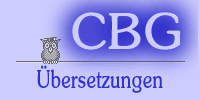| Páginas no tópico: [1 2 3 4] > | Native speakers and language direction Tópico cartaz: Gerard Barry
|
|---|
Hi all,
As a native English speaker, I'm always only "allowed" translate into my native tongue (from German). Yet in several in-house jobs I've had, many (or in some cases most) of my colleagues were native German speakers translating into English, i.e. into their second language. Why is it that I can't translate into German but the Germans can translate into English? Don't get me wrong: I don't want to translate into German as I would find it too difficult and my German ex-colleagu... See more Hi all,
As a native English speaker, I'm always only "allowed" translate into my native tongue (from German). Yet in several in-house jobs I've had, many (or in some cases most) of my colleagues were native German speakers translating into English, i.e. into their second language. Why is it that I can't translate into German but the Germans can translate into English? Don't get me wrong: I don't want to translate into German as I would find it too difficult and my German ex-colleagues did a good job translating into English but I still wonder why there is a double standard here. Does anyone have any thoughts/experiences in this regard? ▲ Collapse
| | | | | Please clarify | May 4, 2022 |
What do you mean by "you are not allowed to"? It's a free market, and we can translate anything in any langiage pair as long as we can find customers willing to trust the jobs to us and pay for them. I think many would agree that a good translator is not just about native language proficiency. I know a lot of translators making very bad translators into their native language, so it is somehow difficult for me to understand what your question is.
| | | | Stepan Konev 
Federação Russa
Local time: 06:35
inglês para russo
| If I'm honest | May 4, 2022 |
I have never seen this mixed approach. In most cases people either believe that nobody should be allowed translating into a non-native language, or believe that you can't find so many native translators to cover all your in-house needs and they accept translating into a non-native language as a standard practice. But not both. What you describe sounds really weird to me.
*Generally speaking (not your specific case):
My guess is that you compare your former in-house experience with yo... See more I have never seen this mixed approach. In most cases people either believe that nobody should be allowed translating into a non-native language, or believe that you can't find so many native translators to cover all your in-house needs and they accept translating into a non-native language as a standard practice. But not both. What you describe sounds really weird to me.
*Generally speaking (not your specific case):
My guess is that you compare your former in-house experience with your present freelance experience. Am I right? If so, then availability and accessibility could be the culprit. Unlike freelance translators who you can reach out almost 24/7, it is not that easy to bring a native, say Japanese, in-house translator from Japan to a remote site in the Russian High North for example.
[Edited at 2022-05-04 18:44 GMT] ▲ Collapse
| | | | Gerard Barry
Alemanha
Local time: 04:35
alemão para inglês
CRIADOR(A) DO TÓPICO
Stepan Konev wrote:
I have never seen this mixed approach. In most cases people either believe that nobody should be allowed translating into a non-native language, or believe that you can't find so many native translators to cover all your in-house needs and they accept translating into a non-native language as a standard practice. But not both. What you describe sounds really weird to me.
*Generally speaking (not your specific case):
My guess is that you compare your former in-house experience with your present freelance experience. Am I right? If so, then availability and accessibility could be the culprit. Unlike freelance translators who you can reach out almost 24/7, it is not that easy to bring a native, say Japanese, in-house translator from Japan to a remote site in the Russian High North for example.
[Edited at 2022-05-04 18:44 GMT]
Yes I think availability of native English-speaking translators in Germany is probably the main reason why my previous employers had more native German speakers than native English speakers translating into English on their payroll. It still kind of annoys me though that I probably wouldn't be hired for an English to German translation job (if I wanted it).
| | |
|
|
|
Gerard Barry wrote:
Hi all,
As a native English speaker, I'm always only "allowed" translate into my native tongue (from German). Yet in several in-house jobs I've had, many (or in some cases most) of my colleagues were native German speakers translating into English, i.e. into their second language. Why is it that I can't translate into German but the Germans can translate into English? Don't get me wrong: I don't want to translate into German as I would find it too difficult and my German ex-colleagues did a good job translating into English but I still wonder why there is a double standard here. Does anyone have any thoughts/experiences in this regard?
Didn’t you just answer your own question: you “would find it too difficult” and they “did a good job”?
It’s kind of moot though. If you’re competing against Germans working into English you have a natural advantage, so be happy!
| | | | Tom in London
Reino Unido
Local time: 03:35
Membro (2008)
italiano para inglês
| You can always tell | May 5, 2022 |
Gerard Barry wrote:
.... It still kind of annoys me though that I probably wouldn't be hired for an English to German translation job (if I wanted it).
Many Germans probably think their English is perfect, but to a native English speaker it always becomes obvious very quickly when a person is non-native. This applies both to spoken English and written English. It also applies to all other languages.
[Edited at 2022-05-05 08:22 GMT]
| | | | Baran Keki 
Turquia
Local time: 06:35
Membro
inglês para turco
| They must be less fussy about their rates | May 5, 2022 |
I can understand why Turks are translating into English as no American or British medical professional will ever take an interest in learning Turkish to become a Turkish to English medical translator (or in any other field of specialization), but for the life of me I can't understand why Germans allow non-natives to translate into English when there must be thousands upon thousands of native English speakers translating from German and specialized in every conceivable subject matter, and not to ... See more I can understand why Turks are translating into English as no American or British medical professional will ever take an interest in learning Turkish to become a Turkish to English medical translator (or in any other field of specialization), but for the life of me I can't understand why Germans allow non-natives to translate into English when there must be thousands upon thousands of native English speakers translating from German and specialized in every conceivable subject matter, and not to mention the fact that a good deal of them are already based in Germany.
I don't think availability has anything to do with this. The only explanation would be that Germans are 'easy to deal with' as far as rates are concerned, compared to Brits or Americans, and making good use of DeepL. ▲ Collapse
| | | | Baran Keki 
Turquia
Local time: 06:35
Membro
inglês para turco
Tom in London wrote:
Many Germans probably think their English is perfect
The most problematic texts (in English) I receive for translation usually come from German or Dutch clients. I thought they were composing/authoring those texts in English themselves, but turns out they were just translating them into their source languages.
| | |
|
|
|
| Post removed: This post was hidden by a moderator or staff member because it was not in line with site rule | Matthias Brombach 
Alemanha
Local time: 04:35
Membro (2007)
holandês para alemão
+ ...
| Not only the Germans ... | May 5, 2022 |
Baran Keki wrote:
I can understand why Turks are translating into English as no American or British medical professional will ever take an interest in learning Turkish to become a Turkish to English medical translator (or in any other field of specialization), but for the life of me I can't understand why Germans allow non-natives to translate into English when there must be thousands upon thousands of native English speakers translating from German and specialized in every conceivable subject matter, and not to mention the fact that a good deal of them are already based in Germany.
I don't think availability has anything to do with this. The only explanation would be that Germans are 'easy to deal with' as far as rates are concerned, compared to Brits or Americans, and making good use of DeepL.
... do so: Technical manuals written in "English" by native speakers of Dutch, Japanese, Chinese, Danish, Swedish, etc. are almost my main earner. The problem here is not necessarily their sometimes odd English, but the fact that most of them as pure translators do not understand the technical concepts they translate. And I don't think that Germans who also translate into English, are easier to deal with as colleagues coming from other countries: They just think they can make a better deal with that direction or their native direction doesn't pay sufficient money anymore. But that is a general problem and yes, DeepL is mostly responsible for that fact.
| | | | | No longer popular | May 5, 2022 |
Baran Keki wrote:
there must be thousands upon thousands of native English speakers translating from German and specialized in every conceivable subject matter
Few schools here seem to teach German these days. So I imagine there is a genuine shortage of English-native translators from German.
| | | | Baran Keki 
Turquia
Local time: 06:35
Membro
inglês para turco
| I'm a bit confused | May 5, 2022 |
Matthias Brombach wrote:
Technical manuals written in "English" by native speakers of Dutch, Japanese, Chinese, Danish, Swedish, etc. are almost my main earner. The problem here is not necessarily their sometimes odd English, but the fact that most of them as pure translators do not understand the technical concepts they translate.
So you say those technical manuals are written in "English" by non-native English speakers (who, I assume, must be the employees of that company, and therefore must have adequate technical knowledge about the products), but then you say "as pure translators do not understand the technical concepts". So do you mean to say that non-native English speaker 'translators' are given the task of writing technical manuals? That sounds a bit weird.
| | |
|
|
|
Matthias Brombach 
Alemanha
Local time: 04:35
Membro (2007)
holandês para alemão
+ ...
| No, not writing... | May 5, 2022 |
Baran Keki wrote: So do you mean to say that non-native English speaker 'translators' are given the task of writing technical manuals? That sounds a bit weird.
... but translating, let's say from Chinese into English, not done by the writers, but by non-native speakers of English, hired by an agency in e.g. China or India. And yes, sometimes engineers (Dutch, Swedish, Danish, Russian, Japanese, German etc.) translate (write) their manuals directly into what they consider English, with nearly the same result, when they don't master the fundamental phrases to express their instructions clearly, consistently and without synonyms.
| | | | Baran Keki 
Turquia
Local time: 06:35
Membro
inglês para turco
| I have this weird theory | May 5, 2022 |
Matthias Brombach wrote:
... but translating, let's say from Chinese into English, not done by the writers, but by non-native speakers of English, hired by an agency in e.g. China or India. And yes, sometimes engineers (Dutch, Swedish, Danish, Russian, Japanese, German etc.) translate (write) their manuals directly into what they consider English, with nearly the same result, when they don't master the fundamental phrases to express their instructions clearly, consistently and without synonyms.
I have no proof of that of course, but I strongly suspect that some companies (mostly British, American, or those from the English speaking world) outsource their manual/press release writing tasks to other countries (just like they outsource their manufacturing operations) and those texts are written (as in created from scratch) by non-native English speaker authors/writers who work for cheaper rates.
I mean you expect to see decent English when you translate the manual of a British forklift manufacturer (not a major one) that doesn't have affiliates all over the world, but you come across such wording that no native English speaker would ever use (not grammatically), it's clearly the product of some someone who thought in his native language and then applied whatever in his head into writing in English. Not back translation as you say, but the text itself was composed by a non-native English speaker at the behest of a British company.
The Chinese manufacture good enough products, but do Indians or Romanians 'produce' good user manuals in English?
| | | | Angie Garbarino 
Local time: 04:35
Membro (2003)
francês para italiano
+ ...
| I have my personal opinion | May 5, 2022 |
I know that my opinion is perhaps too personal, please consider it just a guess
There are languages that for their difficulty are impossible for a non native, to me German is one of them while English is not. For example I studied both but I could never write in German while in English I can. Or at least I think so.
Personal opinion of course.
| | | | | Páginas no tópico: [1 2 3 4] > | To report site rules violations or get help, contact a site moderator: You can also contact site staff by submitting a support request » Native speakers and language direction | Trados Business Manager Lite | Create customer quotes and invoices from within Trados Studio
Trados Business Manager Lite helps to simplify and speed up some of the daily tasks, such as invoicing and reporting, associated with running your freelance translation business.
More info » |
| | Pastey | Your smart companion app
Pastey is an innovative desktop application that bridges the gap between human expertise and artificial intelligence. With intuitive keyboard shortcuts, Pastey transforms your source text into AI-powered draft translations.
Find out more » |
|
| | | | X Sign in to your ProZ.com account... | | | | | |


































